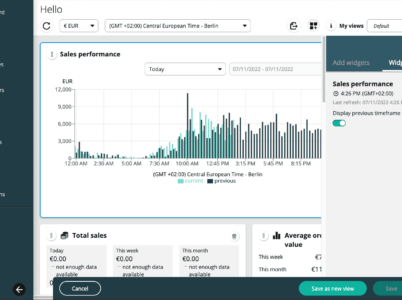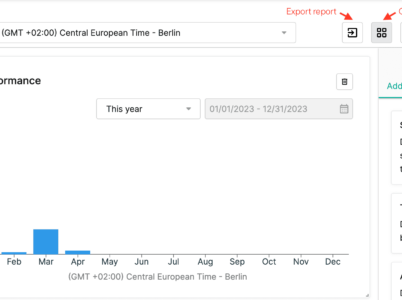AShop is a cutting-edge payment processor software specialising in providing businesses with a comprehensive eCommerce platform. It offers various tools and features to help merchants establish and manage their online stores effectively. AShop is available to simplify the complexities of eCommerce and empower businesses to succeed in the competitive digital marketplace.

One of the key features of Commercetools is its headless commerce approach. This means that the front-end user interface and the back-end commerce engine are decoupled. This allows for greater flexibility and agility in building and customizing e-commerce experiences. Businesses can choose to use their front-end technologies or third-party solutions, which can be easily integrated with Commercetools’ back-end commerce engine.
- Commercetools is equipped with various key features that make it stand out from other e-commerce platforms. For instance, it adopts a headless commerce approach that decouples the front-end user interface and the back-end commerce engine. This provides greater flexibility and agility in building and customizing e-commerce experiences to suit businesses' needs.
- Another important feature is its API-first approach, which offers a comprehensive API that enables easy integration with other systems such as CMS, ERP, and PIM. This simplifies the management of product information, orders, and customer data across different systems.
- Commercetools is built on a microservices architecture that breaks down the platform into smaller, independent services. This enhances scalability, reliability, and resilience, as different parts of the platform can be scaled independently, making it easy to manage and maintain the platform.
- Moreover, commercetools is a multi-tenant SaaS platform, meaning that multiple customers can be served from a single instance of the software. This reduces infrastructure costs and enables businesses to scale their e-commerce operations with ease. Overall, these features make Commercetools a flexible, scalable, and cost-effective e-commerce solution for businesses of all sizes.

Commercetools stands as a cloud-based e-commerce platform, offering businesses a comprehensive suite of tools and services to establish, manage, and expand their online retail operations. Its flexible and modular API-driven approach has garnered significant attention, allowing businesses to tailor e-commerce solutions to their specific requirements.
- Commercetools payment gateway integrations and fees:
Commercetools provides businesses with the flexibility to choose from various payment gateway integrations to cater to their specific needs. This includes support for various payment methods and integrations with popular processors such as Stripe, Adyen, and Braintree. Commercetools does not charge additional transaction fees, but businesses will be required to pay the fees imposed by their chosen payment processor. Businesses need to review the fees and terms of their selected payment gateway or processor to ensure that it aligns with their business requirements and provides the best value for money
- commercetools website security and customer data protection :
Commercetools is committed to maintaining high levels of security and privacy for customer data. The platform employs several measures to achieve this, including encryption, firewalls, DDoS protection, compliance with data privacy regulations, and third-party security audits. Commercetools’ use of encryption ensures sensitive data is protected, while firewalls prevent unauthorized access to the platform and its servers. DDoS protection helps prevent disruptions to the site caused by cyberattacks. Commercetools also complies with various data privacy regulations and undergoes third-party security audits to identify and address vulnerabilities. These measures collectively make Commercetools a secure and dependable choice for businesses looking for a secure e-commerce platform.
- commercetools multi-language support and translation:
Commercetools provides extensive support for multiple languages, making it easier for businesses to cater to international markets. The platform enables businesses to create localized experiences by supporting content and product information in multiple languages. Commercetools also offers automatic translation for product information and content, which simplifies the process of managing and maintaining multilingual content. Additionally, the platform integrates with popular translation services such as Google Translate and DeepL to ensure accurate and fast translation of content. Overall, Commercetools offers robust multilingual support and translation capabilities, which is a valuable feature for businesses targeting global audiences.
- Integrating social media with commercetool:
Businesses can enhance their reach and engagement with customers on various channels by integrating social media with Commercetools. Here are some ways to do this:
Social Login: With Commercetools, customers can sign up or log in to their accounts using their social media profiles, streamlining the signup process.
Social Sharing: Integration with social sharing buttons enables customers to easily share product pages or other content on social media platforms, increasing site traffic.
Social Commerce: Businesses can use Commercetools to connect with social commerce features like Facebook Shops or Instagram Shopping, providing customers with a convenient shopping experience.
Social Media Monitoring: Integrating Commercetools with social media monitoring tools enables businesses to monitor their brand or product mentions on social media platforms, giving valuable insights into customer sentiments.
Overall, integrating social media with Commercetools can have many advantages, including increased reach, engagement, and sales. Commercetools supports social login, social sharing, social commerce, and social media monitoring, which can help businesses develop a comprehensive and effective social media strategy
Commercetools also offers a range of integrations with third-party providers, advanced order management and fulfillment, and tools for customer relationship management, including customer profiles, order history, returns and refunds, customer segmentation, and marketing automation.
Zen Cart is an open-source e-commerce platform that enables users to create online stores with ease. It offers an extensive range of features, including product management, order management, shipping and payment integration, and customer management. Zen Cart is highly customizable and can be tailored to fit the specific needs of a business. It provides a user-friendly interface, making it accessible even for those with little or no experience in web development.
Zepo is an e-commerce platform designed to assist small businesses in India in establishing and operating their online stores. Founded in 2011, Zepo offers a variety of features and services to support businesses in selling their products online. These include website design and development, payment gateway integration, inventory management, and marketing tools.






